Costco Wholesale Bundle
Who Really Owns Costco Wholesale?
Delving into the Costco Wholesale SWOT Analysis is just the beginning; understanding its ownership structure is key to unlocking the secrets behind its success. The 1993 merger fundamentally reshaped Costco's trajectory, making it the retail behemoth we know today. Uncover the forces that drive Costco's low-price, high-volume strategy by exploring its ownership.
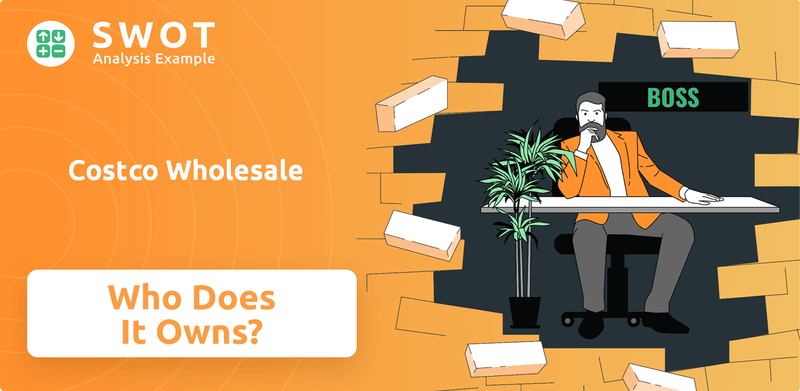
This exploration of Costco ownership will examine the company's history, starting with its founders and early investors. We'll dissect the impact of key mergers and public offerings, pinpointing major institutional and individual shareholders. Discover the composition of the Board of Directors and recent ownership trends to gain a comprehensive understanding of this retail giant's market dynamics and Costco Wholesale SWOT Analysis. Learn about the Costco parent company and who owns Costco stock.
Who Founded Costco Wholesale?
The story of Costco Wholesale's beginnings centers around its founders, James Sinegal and Jeffrey Brotman, who launched the company in 1983. Sinegal's retail background, including experience at Fed-Mart and Price Club, brought operational expertise. Brotman, a lawyer, provided essential legal and business development skills.
The initial ownership structure was primarily held by the founders and early private investors. While the exact equity split between Sinegal and Brotman at the outset isn't publicly detailed, their partnership was crucial. Their combined vision set the stage for the company's growth.
The 1993 merger with The Price Company, founded by Sol Price, marked a significant shift. This merger created Price/Costco Inc., consolidating the warehouse club industry. This event diluted the founders' original stakes as they became part of a larger, publicly traded entity.
James Sinegal, with experience from Fed-Mart and Price Club, brought operational knowledge.
Jeffrey Brotman, an attorney, provided legal and business development skills.
Early ownership was primarily held by the founders and initial private investors.
The 1993 merger with The Price Company diluted the founders' stakes.
The merger indicated a shared vision for dominance in the warehouse club market.
The founding team focused on growth and market penetration.
Early agreements probably included standard vesting schedules for founder shares. The merger with The Price Company, a strategic move, showed a unified goal to lead the warehouse club market. The emphasis was on growth and market penetration, rather than concentrated individual control. As of early 2024, Costco's market capitalization is approximately $370 billion. In fiscal year 2023, Costco's annual revenue reached approximately $242 billion, demonstrating its significant market presence. The company operates a business model centered on membership fees and sales volume. The company's headquarters are located in Issaquah, Washington. Costco's founding date was in 1983. The company is a publicly traded company, and it does have shareholders. The current CEO of Costco is Craig Jelinek.
Costco Wholesale SWOT Analysis
- Complete SWOT Breakdown
- Fully Customizable
- Editable in Excel & Word
- Professional Formatting
- Investor-Ready Format
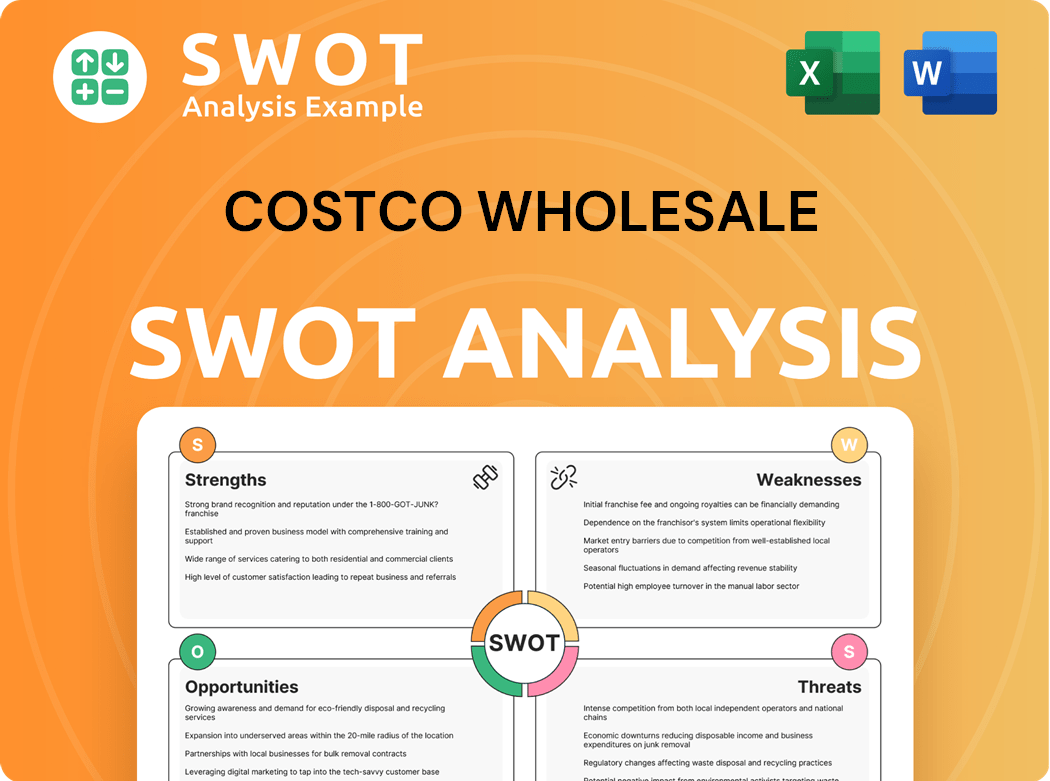
How Has Costco Wholesale’s Ownership Changed Over Time?
The most significant shift in the ownership structure of Costco, formerly known as Costco Wholesale Corporation, occurred in 1993. This was when Costco merged with The Price Company, forming Price/Costco Inc. This merger created a retail powerhouse. Before the merger, Costco had already made its initial public offering (IPO), paving the way for public ownership. As of early 2025, the company operates as a publicly traded entity on the NASDAQ exchange under the ticker symbol COST.
The evolution of Costco's ownership reflects its growth from a merger into a major player in the retail sector. The shift to public trading allowed for wider investment and institutional involvement, shaping the company's financial strategies and shareholder relations. This transition has played a critical role in its expansion and financial performance.
| Event | Date | Impact on Ownership |
|---|---|---|
| Merger of Costco Wholesale Corporation and The Price Company | 1993 | Formation of Price/Costco Inc., later reverting to Costco Wholesale Corporation, expanding its market presence. |
| Initial Public Offering (IPO) | Prior to 1993 | Allowed for public ownership and investment, setting the stage for institutional involvement. |
| Ongoing | Early 2025 | Publicly traded on NASDAQ (COST), with ownership distributed among institutional investors, mutual funds, and individual shareholders. |
The ownership of Costco is largely distributed among institutional investors, mutual funds, and individual shareholders. As of the first quarter of 2025, institutional ownership of Costco stock is substantial, often exceeding 70% of the outstanding shares. Major institutional investors include firms like Vanguard Group Inc., BlackRock Inc., and State Street Corp. For example, in the first quarter of 2024, Vanguard Group Inc. held approximately 43.6 million shares, representing 9.87% of the company. BlackRock Inc. held about 36.8 million shares, accounting for 8.33%, while State Street Corp. held 19.8 million shares, representing 4.49%. These large holdings highlight a significant presence of passive investment, often through index funds and ETFs that track major market indices. Individual insiders, including current and former executives and board members, also hold shares, aligning their interests with the company's performance. This structure generally leads to a focus on long-term growth and shareholder value.
Understanding Costco's ownership structure is crucial for investors and stakeholders alike. The company's evolution from a merger to a publicly traded entity has shaped its financial strategy and market position.
- Costco is a publicly traded company on the NASDAQ, with significant institutional ownership.
- Major shareholders include Vanguard, BlackRock, and State Street.
- Individual insiders also hold shares, aligning their interests with the company's performance.
- The shift towards institutional ownership often leads to a focus on long-term growth.
Costco Wholesale PESTLE Analysis
- Covers All 6 PESTLE Categories
- No Research Needed – Save Hours of Work
- Built by Experts, Trusted by Consultants
- Instant Download, Ready to Use
- 100% Editable, Fully Customizable
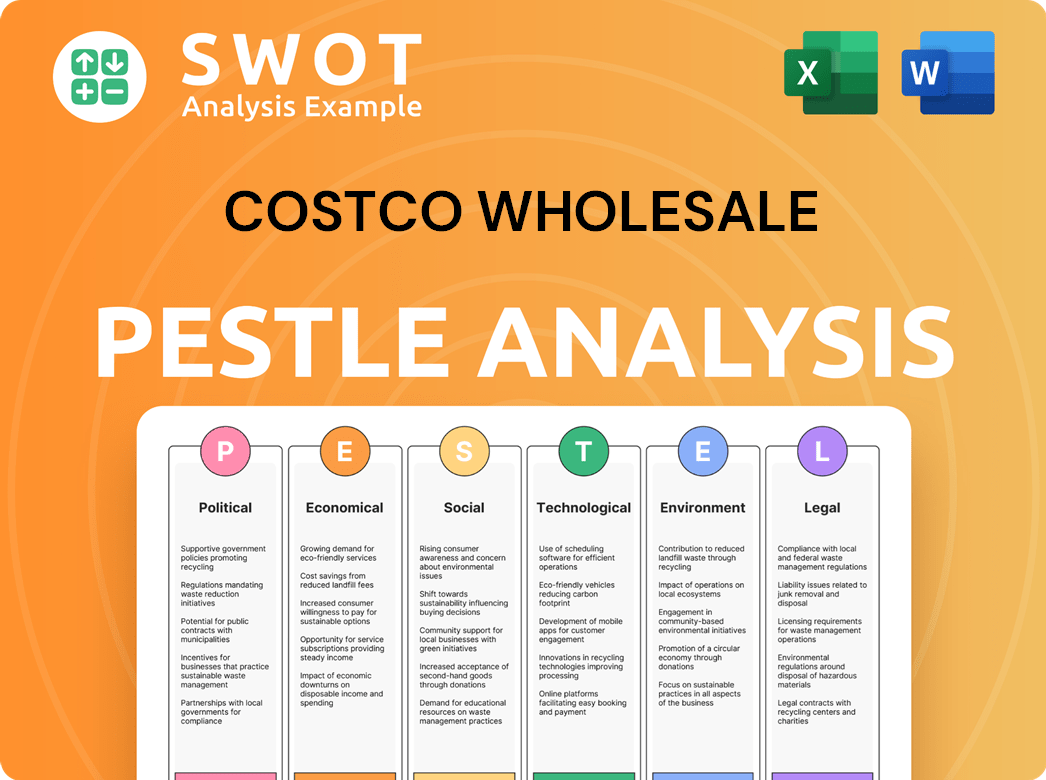
Who Sits on Costco Wholesale’s Board?
As of early 2025, the Board of Directors of Costco Wholesale Corporation oversees the company's operations, representing both major shareholders and independent interests. The board is composed of executive directors, who are part of the company's management, and independent directors, who provide external oversight. While specific board members representing major institutional shareholders like Vanguard or BlackRock are not typically appointed to the board, the interests of these large investors are often considered through engagement with management and independent directors. This structure ensures a balance of internal expertise and external perspectives, fostering sound decision-making and accountability.
The board's role is critical in guiding the company's strategic direction, overseeing financial performance, and ensuring compliance with regulations. The board's composition reflects the company's commitment to corporate governance best practices, which is essential for maintaining investor confidence and long-term value creation. The board's decisions significantly influence the company's performance, including its ability to adapt to market changes and maintain its competitive edge. The board's efforts are geared towards maximizing shareholder value and ensuring the company's sustainable growth.
| Board Member | Title | Affiliation |
|---|---|---|
| Craig Jelinek | President and Chief Executive Officer | Costco Wholesale Corporation |
| W. Craig Jelinek | Director | Costco Wholesale Corporation |
| Jeffrey H. Sine | Lead Independent Director | Costco Wholesale Corporation |
The voting structure for Costco's common stock is generally one-share-one-vote, meaning that each share of common stock entitles its holder to one vote on matters presented to shareholders. This standard structure ensures that voting power is directly proportional to the number of shares owned. There are no indications of dual-class shares, special voting rights, or golden shares that would grant disproportionate control to specific individuals or entities. This promotes a more democratic governance structure where the collective will of shareholders, particularly large institutional investors, holds significant sway. This structure helps maintain the company's focus on long-term value creation and shareholder interests.
The board's structure and voting rights are key to understanding Costco Wholesale. Shareholders have a direct influence on the company's direction. The company's governance structure is designed to protect the interests of all shareholders, ensuring fair representation and accountability.
- One-share-one-vote structure.
- Board composed of executive and independent directors.
- Focus on long-term value creation.
- No recent proxy battles or activist investor campaigns.
Costco Wholesale Business Model Canvas
- Complete 9-Block Business Model Canvas
- Effortlessly Communicate Your Business Strategy
- Investor-Ready BMC Format
- 100% Editable and Customizable
- Clear and Structured Layout
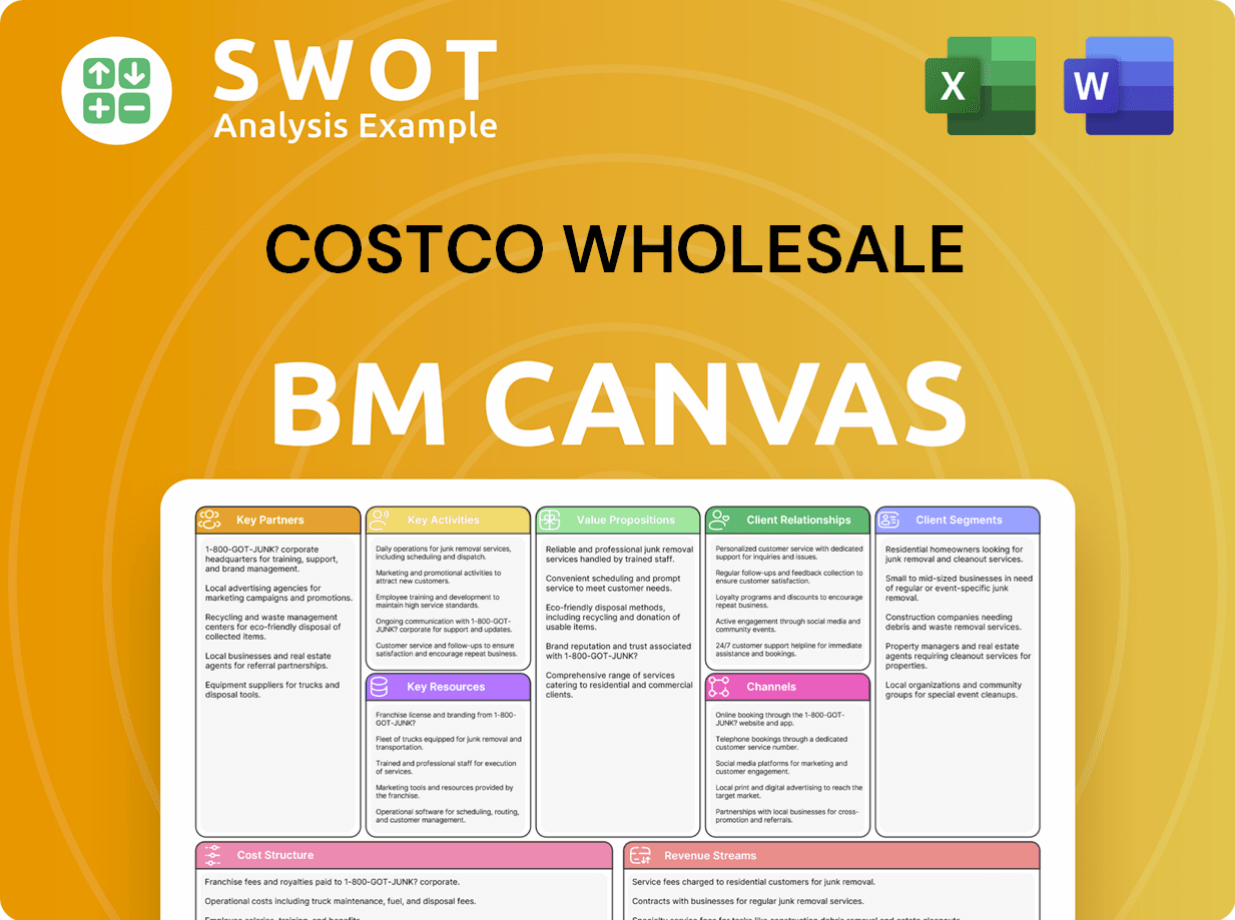
What Recent Changes Have Shaped Costco Wholesale’s Ownership Landscape?
Over the past few years, from late 2021 to early 2025, the ownership of Costco Wholesale has largely mirrored broader market trends, with institutional investors maintaining a significant presence. Share buyback programs have slightly increased the ownership percentages for remaining shareholders, but these have not caused major shifts in the overall ownership distribution. Leadership transitions, such as the 2024 CFO change, reflect internal succession planning rather than significant ownership alterations.
Industry-wide trends show an increasing concentration of ownership among large institutional investors, including passive index funds. This is also the case for Costco, where firms like Vanguard and BlackRock hold substantial stakes. Founder dilution, a natural outcome of growth and public offerings, has long occurred, meaning the original founders no longer hold controlling stakes. Public statements from Costco and analysts typically focus on operational performance and growth strategies, indicating a stable ownership structure. For more insights, check out the Target Market of Costco Wholesale.
| Metric | Value | Year |
|---|---|---|
| Market Capitalization (approx.) | $370 billion | Early 2025 |
| Annual Revenue (approx.) | $247 billion | Fiscal Year 2024 |
| Shares Outstanding (approx.) | 443 million | Early 2025 |
The current ownership structure of Costco reflects a mature, publicly traded company dominated by institutional investors. This structure provides stability, although it also raises questions about corporate governance and the influence of large, passive shareholders. The company's focus remains on operational performance and growth, with no major ownership changes anticipated.
Costco is primarily owned by institutional investors. Major shareholders include firms like Vanguard and BlackRock. The company is publicly traded, and individual investors can also own shares through the stock market.
Yes, Costco is a publicly traded company. Its stock is available for purchase on major stock exchanges. This means anyone can buy shares, although institutional investors hold the majority.
Costco Wholesale was founded by James Sinegal and Jeffrey Brotman. They opened the first Costco warehouse in 1983. The company has since grown into a global retail giant.
The major shareholders of Costco include institutional investors like Vanguard and BlackRock. These firms hold significant percentages of the company's outstanding shares, influencing its strategic decisions.
Costco Wholesale Porter's Five Forces Analysis
- Covers All 5 Competitive Forces in Detail
- Structured for Consultants, Students, and Founders
- 100% Editable in Microsoft Word & Excel
- Instant Digital Download – Use Immediately
- Compatible with Mac & PC – Fully Unlocked
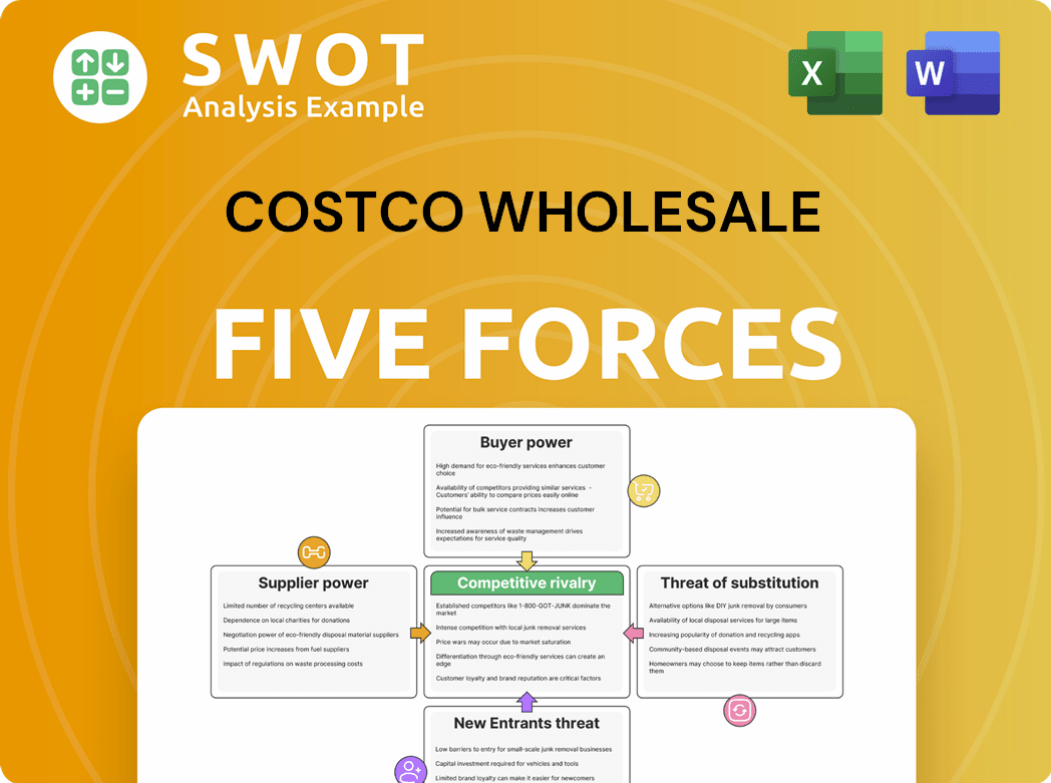
Related Blogs
- What are Mission Vision & Core Values of Costco Wholesale Company?
- What is Competitive Landscape of Costco Wholesale Company?
- What is Growth Strategy and Future Prospects of Costco Wholesale Company?
- How Does Costco Wholesale Company Work?
- What is Sales and Marketing Strategy of Costco Wholesale Company?
- What is Brief History of Costco Wholesale Company?
- What is Customer Demographics and Target Market of Costco Wholesale Company?
Disclaimer
All information, articles, and product details provided on this website are for general informational and educational purposes only. We do not claim any ownership over, nor do we intend to infringe upon, any trademarks, copyrights, logos, brand names, or other intellectual property mentioned or depicted on this site. Such intellectual property remains the property of its respective owners, and any references here are made solely for identification or informational purposes, without implying any affiliation, endorsement, or partnership.
We make no representations or warranties, express or implied, regarding the accuracy, completeness, or suitability of any content or products presented. Nothing on this website should be construed as legal, tax, investment, financial, medical, or other professional advice. In addition, no part of this site—including articles or product references—constitutes a solicitation, recommendation, endorsement, advertisement, or offer to buy or sell any securities, franchises, or other financial instruments, particularly in jurisdictions where such activity would be unlawful.
All content is of a general nature and may not address the specific circumstances of any individual or entity. It is not a substitute for professional advice or services. Any actions you take based on the information provided here are strictly at your own risk. You accept full responsibility for any decisions or outcomes arising from your use of this website and agree to release us from any liability in connection with your use of, or reliance upon, the content or products found herein.